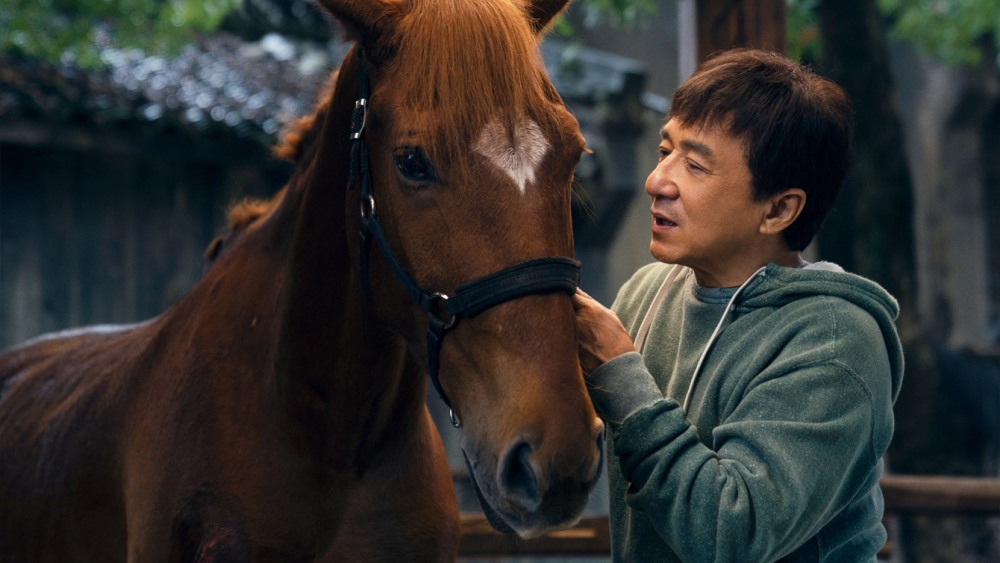‘Ride On’ Review: Jackie Chan’s Sentimental but Fun Stuntman Comedy
Watch any of the films that made Jackie Chan a legend and you notice that so much of his graceful, goofball charisma comes from simply having one more move up his sleeve. Whether changing position while sliding down a plate-glass skyscraper or falling off a clock face onto a series of awnings or dispatching multiple assailants with his witty brand of bendy, aerobic kung-fu, only to end on a silly eye-poke or a gymnastic semi-levitation, the star-making flourish is so often the extra thing he does when anyone else would be finished.
But what do you do when, nearing 70 and with almost 150 movie performances behind you, there aren’t that many one-more-moves left? Maybe you make something like Larry Yang’s “Ride On,” a sappy but enjoyable slice of family fun that has a nice horse doing wacky tricks for the younger viewers and for parents and older fans, is a gently meta, valedictory canter through the paddock of Chan’s previous achievements.
Chan plays Luo, a once-successful stuntman (which gives Yang the excuse to include always-welcome footage of Chan’s stunt work through the decades) who has fallen — through sheets of sugar glass and scaffolding, no doubt — on hard times. Now, accompanied only by Red Hare, the beloved horse he nursed to health from a sickly foal, Luo is reduced to extra work and to dressing them both up in goofy costumes to lure tourists into photo ops. But even this threadbare dog-and-pony existence is under threat. Luo is in debt. Collector Dami (Andy On) and his henchmen try to take Red Hare as collateral, but video of man and horse cartoonishly humiliating the goons goes viral, which both enrages Dami and rekindles interest in Luo’s stunt expertise.
Still, lawyers come to Luo’s house — more a repurposed, open-air dojo/stable where he used to train his stuntmen “disciples” and which has many a useful exposed beam/loose ladder lying about — and announce their intention to repossess Red Hare. In distress, Luo, who refers to the horse as his son, turns to his estranged human daughter, Bao (Liu Haocun), who is now studying for her law degree and has a just-qualified fiancé Mickey (Kevin Guo). Bao is hesitant, but eventually sees her father for the penitent parent he now is, being especially moved by his bond with her equine “brother.” They reconcile, but she wants him to stop putting himself and Red Hare in danger doing stunt work, just when they are getting back in the game — cue a fun montage of Chan in elaborate costumes, many of them nodding to his previous hits, performing horseback hijinks on the sets of various action epics.
In truth, the emotional landscape of “Ride On” is painted with a brush so broad it’s basically a roller, with Chan’s charm and Liu’s radiant Neutrogena wholesomeness just about compensating for Yang’s screenplay, which keeps having to manufacture new rifts to be magically healed with a change of heart, a hug and couple of close-ups. Lao Zai’s inescapable, saccharine scoring is so thickly slathered on that it makes the actually moving moments feel unnecessarily manipulative, and there really is no earthly reason why Yang and editor Super Zhang couldn’t have reined this thing in at less than 126 minutes long.
But it’s hard to stay mad at a movie where part of the bagginess is a result of the generous impulse to salute the often undervalued contributions of stunt teams and to pay tribute to an unparalleled action legend getting back into the saddle one more time. Because as much as Yang goes for, and sometimes reaches, the emotional jugular in the father/daughter story, that’s not where the heart of “Ride On” really resides. Instead it’s in the fights, which are a little more chopped-up and less fluid than they might once have been but are still defiantly done for real even though, as a CG-happy director tells Luo later on, “no one falls for real these days.”
And in the near-obsolete stuntman “code” that Luo clings to, “Ride On” gets further unexpected resonance. To watch a rapt, gently rueful Chan observing his younger self performing some crazy feat of athleticism and bravado, like the umbrella-bus-chase sequence from “Police Story,” is a perfect portrait of the quandary that is the passage of time for an artist whose youthful, elastic recklessness was always so much part of his appeal. “Jumping down is easy,” Luo tells an ex-student who has gone on to be a star stuntman in his own right, “Stepping down is hard.” For all its four-quadrant family friendliness, “Ride On” also feels like Chan, his legacy intact and unimpeachable, not stepping down so much as gracefully stepping across — to the beginning of a new chapter, perhaps, as the elder statesman of the somersault, the scissor-kick and the death-defying stunt. He isn’t owed anything less, and he doesn’t owe the movies anything more.

